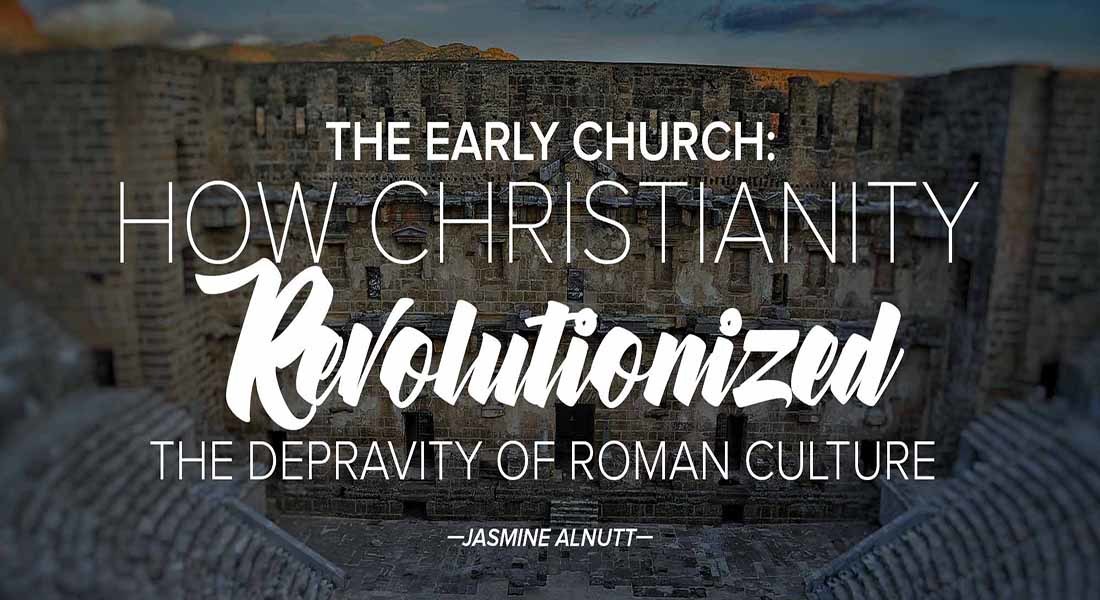
Enjoy part two of this series on the Early Church! Also, read the first part on “How Christianity Revolutionized the Sanctity of Life“
One of the most profound descriptions of the Early Church was made by non-Christians who said in Acts 17:6 that they were “these who have turned the world upside down.” We opened our first article by introducing specific, practical ways in which the early Christians did in fact begin to turn the Roman world they lived in upside down, starting with their regard for the sanctity of life. This week we will explore further areas of Christian influence.
We begin with the area of SEXUAL MORALITY.
The Romans had become degraded in their sexuality—“promiscuous” is putting it mildly! Theirs was a society completely addicted to sex. Not only were sexual acts often committed publicly, they were also portrayed in artwork and on common household items; the Romans never bothered to shield their children from such things! When adultery for women was outlawed, many upper class women simply registered as public prostitutes in order to continue their promiscuity. Not surprisingly, marriage was a pretense and generally disrespected; in fact, it was rare to find a faithful spouse.
Homosexuality was also quite rampant, but what most people don’t realize is that this occurred primarily in the context of pedophilia. The upper classes, and notably the emperors themselves, were prolific in this area; in fact, Emperor Nero actually “married” two young boys. The Romans even practiced bestiality, having given themselves over in the realm of sexuality. No wonder Paul wrote in Romans 1:24-26, “Therefore God also gave them up to uncleanness, in the lusts of their hearts, to dishonor their bodies among themselves, who exchanged the truth of God for the lie, and worshiped and served the creature rather than the Creator, who is blessed forever. Amen. For this reason God gave them up to vile passions.” When you consider these verses in light of Paul’s audience, it certainly gives context and perspective to his words!
This was the world that Christianity was born into—and you can imagine that by living pure and self-controlled lives, honoring marriage by being faithful to their spouses, and serving one another through genuine love instead of satisfying their selfish desires, they stood out like a sore thumb! It is likely that they didn’t have to even say anything against Roman behavior—their lives were a continual protest to the debauchery around them and a shining example of virtue!
Although many Romans naturally looked down on and even despised the chastity of Christians, there were those who admired and respected such self-control and honor for one another. The physician Galen, impressed with Christian sexual behavior, said they were “…So far advanced in self-discipline and…intense desire to attain moral excellence that they are in no way inferior to true philosophers.”¹
Christians also restored the sanctity of marriage; unlike the Romans, Christians treated the wedding ceremony with dignity and respect, taking their vows seriously. In fact, Alvin Schmidt notes, “The dignity and sanctity of marriage that Christianity brought to Roman culture were mostly due to the early Christian women.”² They really took their roles as wives and mothers seriously, such that a pagan named Libanius exclaimed, “What women these Christians have!”³
Not only did Christians highly esteem marriage, they advocated privacy in their sexual relationships in contrast to the wanton public nature of Roman sexuality. In fact, it has been noted by various historians that the concept of privacy in general has strong Christian roots dating back to this time!
As with the areas of infanticide and child abandonment, it was the influence of Christians living upright, pure lives that eventually worked its way up the ladder, so that when Constantine became the first Christian Emperor, he radically changed Roman society’s attitude toward marriage to conform with Christian standards. This naturally trickled down into society’s views concerning homosexuality, pedophilia and bestiality as well. Think of what Western society today would be like if Christ and Christianity had never come on the scene!
The early Christians certainly teach us never to underestimate the power of selfless love and service; the same testimony and example that transformed an empire can transform society today!
Next let’s look at the area of CHARITY & HEALTH CARE.
As you can probably imagine, a culture like Rome that had such a low regard for human life did not exactly excel in terms of compassion for the needy! The Romans practiced something called liberalitas, which was in essence, “You scratch my back, I’ll scratch yours,” reciprocal charity. Because of this, Romans viewed voluntary, unreciprocated giving as suspicious and defying common sense—why give to someone without receiving anything in return? It was a very pragmatic, utilitarian, but wholly calloused and self-centered viewpoint!
Granted, many Greek and Roman philosophers encouraged voluntary giving, and there were isolated incidents in which the wealthy would assist those in need in time of crisis, but the mainstream culture generally disregarded such practices.
Naturally, the lack of compassionate giving meant the Romans gave no thought to medical treatment for the ill or dying. They did make provision for people to have their illnesses diagnosed with medicine, but there was no nursing care. The only hospital-like facilities were for sick slaves, gladiators and soldiers. Any health care beyond that—especially for the poor, common folk—was rare if not totally absent. For example, a third century Christian bishop named Dionysius described Roman behavior during a plague in Alexandria as follows: “They thrust aside anyone who began to be sick, and kept aloof even from their dearest friends, and cast the sufferers out upon the public roads half dead, and left them unburied, and treated them with utter contempt when they died”4 Plato said that a poor man who was no longer able to work because of illness should be left to die—again, a very pragmatic viewpoint, but utterly devoid of compassion!
Not surprisingly, Christians who followed Jesus’ example of compassion for all in need stood out in stark contrast to Roman society. Contrary to liberalitas, the Christians practiced something called caritas, which meant “giving to relieve the recipient’s economic or physical distress without expecting anything in return.”5 It was totally unconditional, voluntary giving, inspired by the love of God and His call to love one another.
Christians continually reached out to practically provide assistance to those in need. This was especially notable during times of plague; when the Romans would flee and abandon the sick and dying, Christians would stay behind to nurse them without any regard for their own well-being or safety. This caused Emperor Julian the Apostate (who had renounced the Christian faith) to bemoan the fact that “The impious Galileans relieve both their own poor and ours.”6 The behavior and testimony of Christians in fact led to the salvation of many Romans.
Eventually, it was the practical care and concern of Christians that led to the establishment of the first real hospitals, starting with St. Basil of Caesarea in 369 A.D. Christians were also responsible for establishing the first facilities for elderly care and the first orphanages, a natural response to the New Testament exhortations concerning care for widows and orphans. In fact, Schmidt notes that even the custom of requiring godparents to take care of children if their parents died is a Christian innovation. In a culture that practiced infanticide and child abandonment, this was absolutely revolutionary!
Schmidt sums it up best, “When modern secularists show compassion today upon seeing or hearing of some human tragedy…they show that they have unknowingly internalized Christianity’s concept of compassion…. But had these…not grown up under the two-thousand-year-old umbrella of Christianity’s compassionate influence, they would probably be without much compassion, similar to the ancient Greeks, Romans, and others. As Josiah Stamp has said, ‘Christian ideals have permeated society until non-Christians, who claim to live a decent life without religion, have forgotten the origin of the very content and context of their decency.”7
Roman society was indeed depraved, but as we continue to see the powerful influence of the early Christians on a decadent culture, it may inspire us with confidence in what God can do through His people in our own culture today—may it start with us!
¹Cited in Will Durant, Caesar and Christ: A History of Roman Civilization and of Christianity from Their Beginnings to A.D., 325.
²Alvin J. Schmidt, How Christianity Changed the World
³Cited in L. Millar, Christian Education in the First Four Centuries
4Dionysius, Works of Dionysius, Epistle 12.5
5Alvin J. Schmidt, How Christianity Changed the World
6Julian, Epistles of Julian, 49.
7Alvin J. Schmidt, How Christianity Changed the World






